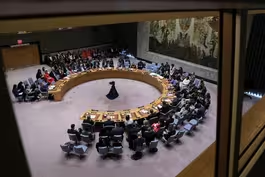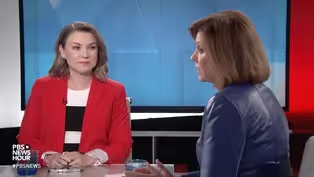
Stephen Breyer on new book 'Reading the Constitution'
Clip: 3/25/2024 | 10m 30sVideo has Closed Captions
Stephen Breyer on new book 'Reading the Constitution' and debate over how to interpret it
For as long as America has had a constitution, there's been debate over how to interpret it. That’s particularly true when it comes to hot-button Supreme Court cases. For nearly 30 years, Stephen Breyer served on the nation’s highest court, deciding on cases with ramifications still being felt across the country today. Amna Nawaz spoke with Breyer about his new book, “Reading the Constitution."
Problems playing video? | Closed Captioning Feedback
Problems playing video? | Closed Captioning Feedback
Major corporate funding for the PBS News Hour is provided by BDO, BNSF, Consumer Cellular, American Cruise Lines, and Raymond James. Funding for the PBS NewsHour Weekend is provided by...

Stephen Breyer on new book 'Reading the Constitution'
Clip: 3/25/2024 | 10m 30sVideo has Closed Captions
For as long as America has had a constitution, there's been debate over how to interpret it. That’s particularly true when it comes to hot-button Supreme Court cases. For nearly 30 years, Stephen Breyer served on the nation’s highest court, deciding on cases with ramifications still being felt across the country today. Amna Nawaz spoke with Breyer about his new book, “Reading the Constitution."
Problems playing video? | Closed Captioning Feedback
How to Watch PBS News Hour
PBS News Hour is available to stream on pbs.org and the free PBS App, available on iPhone, Apple TV, Android TV, Android smartphones, Amazon Fire TV, Amazon Fire Tablet, Roku, Samsung Smart TV, and Vizio.
Providing Support for PBS.org
Learn Moreabout PBS online sponsorshipWILLIAM BRANGHAM: For as long as America has had a Constitution, there's been heated debate over how to interpret it.
The U.S. Supreme Court is often where those debates are most intense and their judgments the most far-reaching.
For nearly 30 years, Stephen Breyer served on the nation's highest court, deciding cases that still resonate today.
Breyer recently spoke with Amna Nawaz about how he interprets the nation's foundational document.
That's the subject of his new book, "Reading the Constitution: Why I Chose Pragmatism, Not Textualism."
AMNA NAWAZ: Welcome back to the "NewsHour."
Thank you so much for joining us.
STEPHEN BREYER, Former U.S. Supreme Court Associate Justice: Well, thank you.
AMNA NAWAZ: So there is, I think it's fair to say, a sort of sense of mission in this book.
You outline your concerns about textualism and originalism, interpreting the Constitution based solely on its text and the intent at the time it was written.
And you write that you hope that the next generation of law students or two will read this book and that you can slow what you call a tidal wave of sorts.
Tell us what you meant by that.
STEPHEN BREYER: Well, I think there is a traditional way of interpreting statutes and interpreting the Constitution.
And that traditional way starts, just like textualism starts, with the language.
I mean, if you have a statute and the statute has the word fish, fish doesn't mean carrot.
You know, a carrot is not a fish.
OK?
(LAUGHTER) STEPHEN BREYER: Now, some, at the moment, textualists think what you should do is stop right there.
Stop right there.
Just read the words, or read the words and see what they meant in the Constitution to those who were alive in 1788, or 1789, or maybe 1869 or something like that.
And I think that's not traditional, and I think it could be harmful.
And so I have, in the 40 years I have been a judge and 28 on the Supreme Court, I have taken a different approach.
You start with the language, but then that might not tell you the answer.
Well, look to other things.
What did John Marshall say?
He said, look to everything that will help.
And what did Holmes and Brandeis and the others say?
Look to the purposes.
Why did Congress put those words in there?
Why did Congress write this statute?
And when you work that out -- and it isn't always easy to do, but it helps very often to figure out, why?
What was the purpose?
You see, you have to know the purpose, and you have to look at the consequences quite often.
I mean, look at the values.
Is this consistent with those basic values in this book, right here in this document right here?
AMNA NAWAZ: As you know, many of the justices on the court identify as originalists.
That includes Justices Thomas and Gorsuch, Kavanaugh, Barrett, even Justice Jackson.
What do you think those justices are missing in that approach?
STEPHEN BREYER: I think that, look, they're friends of mine.
We get on well personally.
I have never heard a word in anger, really, or insult to any other judge made by one of the judges in the conference, but we don't agree there about the usefulness of that textualism.
What they're thinking is, it's so simple.
It's clear.
Well get a clear answer.
Well, good luck, and I have a few hundred pages here to explain why that doesn't work.
Or we will stop the judges from substituting what they think is good for society, substituting that for the law.
And what I try to explain here is, no, that doesn't work either.
AMNA NAWAZ: You devote significant time in the book to the 2022 Dobbs decision, which did eliminate the constitutional right to an abortion.
And on that, you write this: "If the only basis for overruling an earlier case is that an originalist judge applying originalism to the earlier case concludes that it was wrongly decided, then many, many earlier cases will be candidates for overruling."
Do you believe that earlier rulings on same-sex marriage or interracial marriage or contraception, other protections based on that same right to privacy that undergirded Roe, those could also be overruled by this court?
STEPHEN BREYER: The answer to that is no, but leave out the specifics of the cases, because I don't want to comment on cases that might come or might not come, or might be decided this way or that way.
But I don't... AMNA NAWAZ: But why is the answer no?
STEPHEN BREYER: Why is the answer no?
Because if you started overruling every case that wasn't decided in a textualist way, you would overrule half the law, or maybe three-quarters, and there would be chaos.
There wouldn't be law.
So, I don't think anybody is going to do that.
AMNA NAWAZ: As you know, the majority in Dobbs did say that they believe that Roe had been wrongly decided.
STEPHEN BREYER: Yes.
AMNA NAWAZ: But earlier, in each of their cases, with Justices Gorsuch, Kavanaugh and Barrett, in each of their confirmation hearings, this is actually what they said when they were asked about Roe.
NEIL GORSUCH, U.S. Supreme Court Associate Justice: A good judge will consider it as precedent of the U.S. Supreme Court worthy as treatment of precedent like any other.
BRETT KAVANAUGH, U.S. Supreme Court Associate Justice: It is settled as a precedent of the Supreme Court.
AMY CONEY BARRETT, U.S. Supreme Court Associate Justice: Richard Fallon from Harvard said, Roe is not a super precedent because calls for its overruling have never ceased, but that doesn't mean that Roe should be overruled.
AMNA NAWAZ: Justice Breyer, how do you square what they said then with how they eventually ruled on Roe?
STEPHEN BREYER: First, I would say keep the confirmation process out of it.
I'm not an expert on confirmation.
Remember, I was not a confirming person.
I was a person who was confirmed.
So to ask me about that process is sort of like asking for the recipe for chicken a la king from the point of view of the chicken.
So I'm not talking about that.
I am talking about how do you decide whether to overrule.
Now, three of us, Justice Kagan, Justice Sotomayor, and I, wrote a joint dissent.
We thought it was totally -- it was wrong to overrule Roe.
It was wrong to overrule Casey.
Those were cases that were working pretty well.
And you start overruling too many cases, you won't have a law left.
You will have a shambles.
And so be careful.
AMNA NAWAZ: There's a note of caution in this book as well that you seem to be issuing for your fellow justices.
You write -- quote -- "They may be well concerned about the decline in trust in the court, as shown by public opinion polls.
One such poll late last year found only about 28 percent of U.S. adults said they had a great deal of confidence in the Supreme Court; 36 percent had some.
Another 36 percent had little or none."
How do you look at that?
I mean, is that within the court's power to turn around?
And, if so, how should they do that?
STEPHEN BREYER: Well, that is a very good question.
And it's a difficult question to answer.
And I think the best answer was given by Professor Freund, who is a professor here at Harvard.
He said, no judge, no decent judge will take into account the political temperature of the day.
But all judges do and probably should take into account the climate of the era.
So if you tell me in an opinion poll that judges are not looked at well or they don't like them or people don't like them, have those people read the many cases that probably the bottom line they do agree with?
Are they deciding on the basis of bottom line or the reasons?
And the judges on this court, like judges on prior courts, probably are unanimous about 40 percent of the time.
And so you don't just look to opinion polls.
On the other hand, sometimes, you see -- and why this difficult and a good question -- sometimes, it does matter.
AMNA NAWAZ: On this trust issue, do appearances matter?
I mean, you have seen all the reporting about ethics concerns among some of the justices.
There's questions about appropriate recusals.
Would it, for example, help to build back trust in the court if Justice Thomas were to recuse himself from cases related to January 6, given the role that we know his wife played in those events?
Would that kind of thing help build trust back in the court?
STEPHEN BREYER: Justice Thomas or any other justice on any court, whether it's the Supreme Court or some other court, must do what the law says they must do.
I mean, they interpret the statutes according to law, and they all think that's the job.
You're talking about ethics.
Of course, ethics in general and in particular is relevant to Supreme Court justices.
I had a readily accessible seven volumes written by the Judicial Conference, I think, explaining all the different ethical rules for all the judges.
And in my experience there, the judges, when they had difficult questions, would consult those volumes, and they'd ask other colleagues what they thought, and they would try to do the right thing.
And you want to ask specifically about... AMNA NAWAZ: Specific to January 6 cases, do you think it would help, in terms of trust in the court?
STEPHEN BREYER: No, I would not take myself out of a case unless I thought that's what the ethics required.
And that's just as important as taking yourself out of the case when the ethics requires that.
The main point for the public is, of course, you follow ethical rules if you're a judge, and you do your best to do it, and it isn't always easy, but you're not pushed one way or the other by the public opinion.
You are pushed by what is right, and that is a fundamental rule.
The job of the judge is to do what you think is right.
And that has been my experience.
That has been my experience over 40 years.
And I try to write enough here not just to give you that conclusion.
I mean, you can't just accept that conclusion from the fact that I say it, but you can, perhaps, be moved if I show you not the theory of the thing, but rather how these approaches, different approaches, how they work out in practice through cases, through examples, written in a way I hope that people who are not judges, who are not lawyers can understand what I'm talking about.
AMNA NAWAZ: There is so much more we could talk about.
It's a fascinating book.
Justice Stephen Breyer, author of "Reading the Constitution," thank you so much for joining us.
I really enjoyed our discussion.
STEPHEN BREYER: Well, thank you.
Thank you.
Thank you.
Families slip into poverty after child tax credit expires
Video has Closed Captions
Clip: 3/25/2024 | 10m 16s | Families slip back into poverty after pandemic-era child tax credit expires (10m 16s)
Fate of abortion pill mifepristone goes before Supreme Court
Video has Closed Captions
Clip: 3/25/2024 | 7m 48s | Future of abortion pill mifepristone will be decided by Supreme Court (7m 48s)
Rift between U.S., Israel widens over cease-fire resolution
Video has Closed Captions
Clip: 3/25/2024 | 4m 46s | Rift between U.S. and Israel widens over U.N. Gaza cease-fire resolution (4m 46s)
Tamara Keith and Susan Page on Trump's legal issues
Video has Closed Captions
Clip: 3/25/2024 | 6m 58s | Tamara Keith and Susan Page on the political impact of Trump's legal issues (6m 58s)
Trump hush money trial set for April 15
Video has Closed Captions
Clip: 3/25/2024 | 5m 11s | Trump hush money trial set for April 15 as N.Y. court reduces fraud bond (5m 11s)
Providing Support for PBS.org
Learn Moreabout PBS online sponsorship
- News and Public Affairs

FRONTLINE is investigative journalism that questions, explains and changes our world.

- News and Public Affairs

Amanpour and Company features conversations with leaders and decision makers.












Support for PBS provided by:
Major corporate funding for the PBS News Hour is provided by BDO, BNSF, Consumer Cellular, American Cruise Lines, and Raymond James. Funding for the PBS NewsHour Weekend is provided by...




